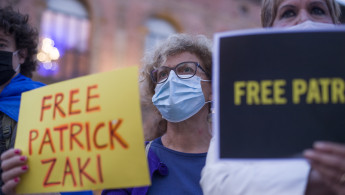Egyptian court orders release of jailed researcher: rights group
An Egyptian court ordered the release of jailed researcher Patrick Zaki on Tuesday, the human rights group Egyptian Initiative for Personal Rights (EIPR) reported, and Italy's foreign minister said Zaki "is no longer in prison".
Zaki, a graduate student at the University of Bologna, was arrested in February 2020 during a visit to Egypt and accused of spreading false information over an article he wrote about the plight of Egypt's Christians.
Arguments in the trial still need to be heard when it resumes, with the date set for Feb. 1, said EIPR's Lobna Darwish. "The judge just postponed and released him in the meantime," she said, adding that it was not immediately clear how quickly Zaki would be physically released.
Zaki had been held in pre-trial detention for more than a year and a half before his trial began in September.
Italian Foreign Minister Luigi Di Maio said on Twitter: "First goal achieved: Patrick Zaki is no longer in prison. We are now continuing to work quietly, with perseverance and commitment. A big thank you to our diplomatic corps."
🔴 Patrick Zaki sarà scarcerato, anche se rimane ancora sotto processo.
— Amnesty Italia (@amnestyitalia) December 7, 2021
Un passo avanti enorme nella direzione della giustizia.
Oggi scenderemo in piazza con uno stato d'animo diverso. Finalmente.#FreePatrickZaki
Amnesty Italia also called for Zaki's freedom in a tweet saying "he is still on trial" despite his release, but that the release is "a huge step in the direction of justice".
Zaki's case has resonated in Italy, coming after the 2016 killing in Egypt of Italian graduate student Giulio Regeni shook relations between the two countries.
Zaki also worked as a researcher at EIPR, a leading independent rights group in Egypt.
EIPR says Zaki was beaten, subjected to electric shocks and threatened following his arrest.
Egyptian authorities have not commented on the EIPR's assertions.
The authorities routinely deny allegations of ill treatment by the security forces and in places of detention.
(Reuters)





 Follow the Middle East's top stories in English at The New Arab on Google News
Follow the Middle East's top stories in English at The New Arab on Google News


